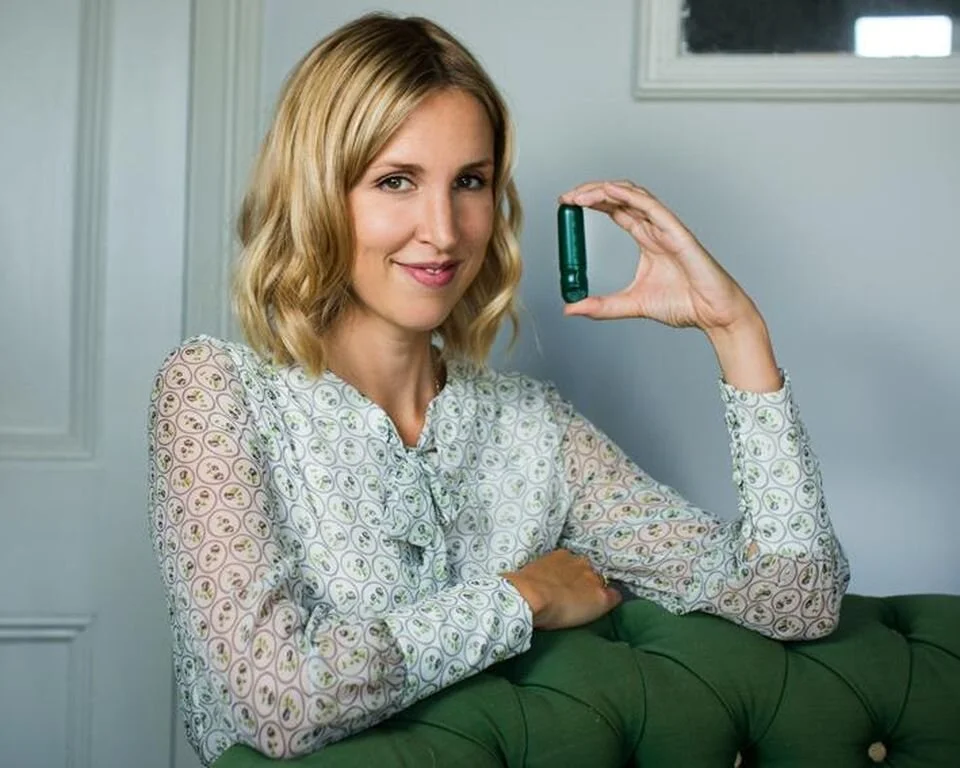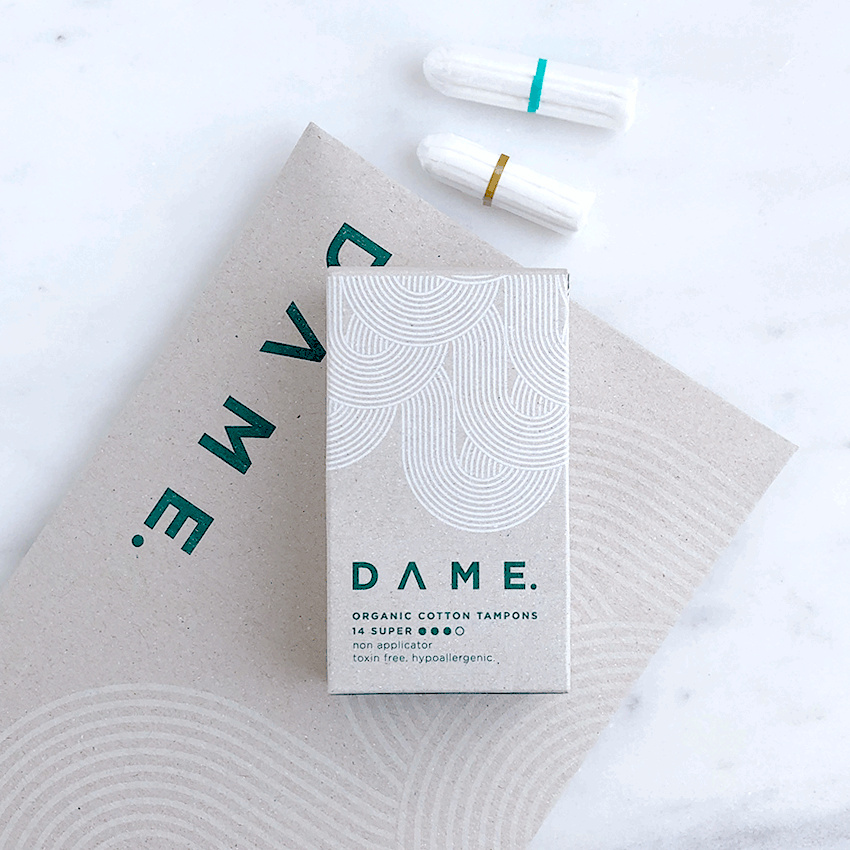WoW Woman in Femcare | Celia Pool, co-founder of DAME
Interview by Anja Streicher
Celia Pool is a co-founder of DAME, a brand rethinking personal care by reducing its environmental footprint without compromising on performance or design. DAME launched the world’s first reusable tampon applicator and DAME organic cotton tampons, which are free from toxins and synthetic materials. We had the pleasure of having Celia as one of our panelists for our event Intimately Organic: The Future of Body Products so we used this opportunity to ask her about her entrepreneurial journey and the story behind DAME.
1. Celia, what’s the story behind starting DAME?
We were already working in the menstrual product sector, delivering a range of high street products to women across the UK via a subscription service. But increasingly we couldn’t ignore the waste generated by these products. 100 billion period products are thrown away around the world each year, most of which are single-use and made of plastic. Once we realised the extent of the problem we knew we had to help bring about change in the industry and fast. DAME was born from this.
Great reusable menstrual products have existed for decades, but only a small percentage of people use them. Our research showed that it was the significant habit change that was preventing lots of women from switching to reusables. So we saw an opportunity to create a sustainable solution that was really easy for people to adopt - particularly for the 60% of UK women who prefer applicator tampons.
After 2 years of careful design, we launched D, the world’s first reusable tampon applicator. D works like a normal applicator, but is reusable - providing comfort, without the waste. It’s made from medical grade, antimicrobial materials so that all you need to do is rinse it in cold water between uses, it’s that easy. By switching to a D, a woman can save up to 12,000 disposable applicators from reaching landfill or polluting our oceans.
2. What drew you to the organic space?
Once we decided to make our applicator reusable, we knew we wanted to make the best possible tampon too. Standard tampons often contain odour neutralisers, dyes, pesticides, fragrances, and a mix of other synthetics, but due to lack of regulation, brands are under no legal obligation to disclose their ingredients. These tampons are then sitting in a highly permeable part of our bodies, where the synthetic ingredients and chemicals can be absorbed through the mucus membrane into our bloodstream. You only have to look at the rise in vaginal irritation and other issues to see that there might be a connection - especially when you consider the average woman wears a tampon for a cumulative 7.5 years of her life!
We believe women deserve better, which is why our tampons are made from 100% organic cotton and nothing else. Organic cotton farming does not use any pesticides so it is safer for the farmers, the earth and your body. It also means our tampons are biodegradable, unlike conventional tampons which can contain plastic through their core and coverstock (the invisible net which holds the tampon together).
3. What was it like starting a business, what were some of the challenges you’ve faced as an entrepreneur so far?
I’ve definitely experienced some of the classic female-led female-product issues as a founder, but those were mainly in the early days and from prehistoric male investors who called this space ‘niche’ - to which 3.5 billion women might disagree. However that’s just a small part of it. Growing a business is like growing a baby, of which I’ve also been doing a bit of too. You start out with such high hopes and visions of smooth sailing. Then the savage reality hits. You make a bunch of mistakes in the early days that luckily no one sees and you can kind of get away with. But, then they get free will (gulp) and morph into this whole new being which can be incredibly testing at times but is also incredible to watch develop, change and achieve things you never dreamed possible. And you never, EVER stop worrying about them.
4. What is something that you wish they had taught you about women’s health at school? And how important is education on what you put inside your bodies for young girls?
I wish they’d covered women’s health as a continuous conversation at school. I had just one lesson and that was it. But our bodies are constantly changing at that age, and so revisiting it every year is crucial to allow girls, and boys, to increase their awareness about what is happening and feel more comfortable. I also wish we’d been taught about the more sustainable menstrual options at school, rather than just being handed a giant disposable pad. Cups and reusable cloth pads have been around for decades, but I only discovered them in my late 20’s, by which stage I was so institutionalised to the disposable products I’d always been using, making the switch felt like a big leap. We need to give young girls access to the full choice from the start.
5. We have so many code words and euphemisms for menstruation, we still hide our tampons in our bags and feel ashamed talking about it. What can we do to start changing this? I do feel we did start talking about it, but it’s time we act upon it too.
I actually don’t think euphemisms are always a bad thing. They can allow people who might feel apprehensive about a conversation to join in. Yet at the same time, they obviously shouldn’t dominate the discourse and figures of authority (parents, teachers, etc.) should encourage children to use the correct words for their body parts and natural functions, and open up the conversation around them. By normalising the language we can start to normalise our interactions with our bodies.
6. In your opinion, what’s next for femcare? We see more and more use of CBD oil in femcare products, what are your thoughts on that?
Menstruation is often classed as a vital sign that assists in recognising deficiency in other areas of the body. There’s been extensive research on gut health and its holistic implications, so it would be great to see similar resources go into researching menstruation (and not from the big brands wanting to drive sales). There’s potential for us to learn so much in this area.
With regards to CBD, it is still unchartered territory. There seems to be a push to include CBD in every product regardless of the efficacy or demand. We’re seeing more and more that a big question mark remains over issues of dosage and having the ability to control and tailor the amount you use. But if someone finds that CBD oil works for them personally, then that’s brilliant. We’re big believers in choice and it’s great to see that consumers can have the options that work for them.
7. What’s the most rewarding thing about your job?
Seeing the positive impact we are having first hand is epic. We held an event in London last week for some of our DAME customers. It was amazing to meet them face to face and to hear their personal stories about why they use our products, what they love about them and what we can do better - because you can always do better. Someone was telling us about how she had been on holiday in Sardinia and was horrified to see all the tampon applicators on the beach. The enormity of this waste problem hit her. She said she felt relieved when she heard about DAME that she could make a sustainable change and loved how easy it was to use. Those are moments you want to snatch and bottle up.
8. What’s the best piece of advice you’ve ever been given that helped you on your entrepreneurial journey?
Fail cheap and fail fast. You’ve just got to keep learning and moving on.
Website: https://wearedame.co/
Instagram: https://www.instagram.com/dameforgood/
Facebook: https://www.facebook.com/DAMEforGood/
Twitter: https://twitter.com/DAMEforGood
This interview was conducted by Anja Streicher, Chief Marketing Officer of Women of Wearables. She is passionate about women's health, supporting women in business and is still trying to figure out how to balance motherhood and business.






